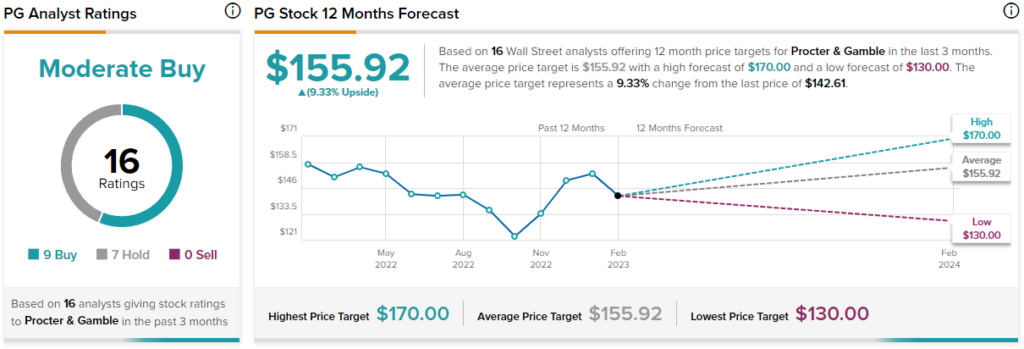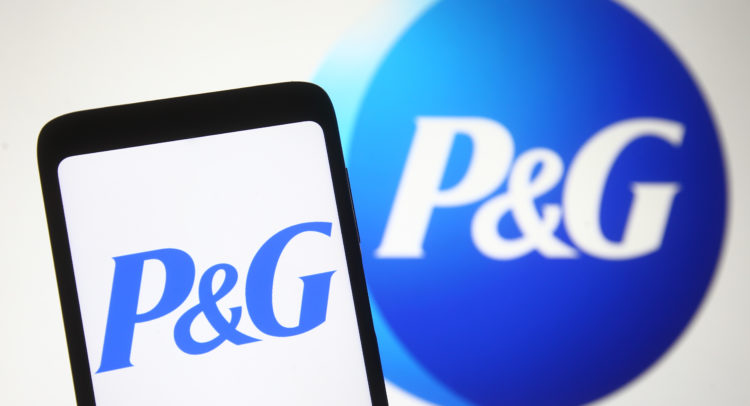Procter & Gamble’s (NYSE:PG) robust portfolio of brands has managed to generate strong results for the company lately, as has been the case with most giants in the consumer staples sector. While several distressing factors pressured the company during the first half of Fiscal 2023, including elevated inflation and foreign exchange headwinds, Procter & Gamble managed to deliver durable numbers. Additionally, with both inflation and FX rates gradually moving in favor of the company, P&G’s performance is set to improve further from here.
Maximize Your Portfolio with Data Driven Insights:
- Leverage the power of TipRanks' Smart Score, a data-driven tool to help you uncover top performing stocks and make informed investment decisions.
- Monitor your stock picks and compare them to top Wall Street Analysts' recommendations with Your Smart Portfolio
P&G’s Fiscal Q2 Results: A Closer Look
P&G’s Fiscal 2023 Q2 results were a shining example of how a company can succeed even in the face of inflationary pressures and foreign exchange headwinds, thanks to its products enjoying resilient demand and strong pricing power.
Specifically, the company managed to generate net sales of $20.8 billion, just 1% lower year-over-year, as unfavorable foreign exchange translation pushed the top-line results slightly lower. That said, organic sales, which exclude any FX impacts and other one-off events such as acquisitions and divestitures, actually rose 5%, illustrating consumers’ resilient underlying demand for the company’s products.

To dive a little deeper into this, the 5% increase was derived from a 10% gain from higher pricing and a 1% increase from a favorable product mix, partially counterbalanced by a 6% decline in shipment volumes. So, while some consumers did react negatively to P&G’s more premium pricing, it’s clear that P&G’s products are highly inelastic, as we would expect, given that a substantial increase in prices led to a much softer decline in volumes sold.
Regarding the company’s profitability, P&G’s operating margin for the quarter declined 170 basis points year-over-year or 70 basis points on a constant-currency basis. Admittedly, this is quite a discouraging contraction in margins, as it already included gross productivity savings of 110 basis points.
Nevertheless, given the ongoing wrath of inflationary pressures both on the materials and workforce fronts, this can also be considered a pleasing result. A mere 170 basis point decline in operating margins actually displayed how P&G’s strong pricing power neutralized most inflationary pressures.
Besides inflation, however, the company had to battle against foreign exchange headwinds due to its global reach. The negative impact of foreign exchange was also noticeable in the company’s earnings per share for the quarter, which came in at $1.59, 4% lower on a GAAP basis but 5% higher when accounting for constant currency — similar to net sales.
This illustrates the challenge of simultaneous high-single-digit to low-double-digit inflation and foreign exchange pressures that many companies face, yet P&G’s world-class qualities allowed it to overcome these obstacles to a large extent.
What to Expect From Here
Moving forward, it’s reasonable to expect that as far as demand goes, P&G’s leading brands portfolio will keep performing well. P&G still sells everyday essentials like food, household goods, and personal care items that consumers can’t live without, regardless of the state of the economy. So, in that regard, I wouldn’t expect any surprises.
What is expected to change in the company’s results moving forward, though, are both the effects of inflation and FX rates, which have shifted in favor of the company in recent months. Specifically, the annual inflation rate in the U.S. dipped for the sixth consecutive month to 6.5% in December 2022, while the U.S. dollar has weakened by nearly 12% since September.
These developments should allow P&G’s profitability to breathe a little easier in the coming quarters. This is further supported by P&G’s management raising its outlook for the year, projecting a full-year all-in sales growth decline of -1% to 0% compared to Fiscal 2022, up from the prior range of -3% to -1%.
The company also expects earnings-per-share growth to be between 0% and 4% compared to last year’s earnings per share of $5.81, indicating further improvements to the bottom line in the second half of the year.
Is PG Stock a Buy, According to Analysts?
Turning to Wall Street, Procter & Gamble has a Moderate Buy consensus rating based on nine Buys and seven Holds assigned in the past three months. At $155.92, the average Procter & Gamble stock forecast implies 9.3% upside potential.

Takeaway: Quality Comes at a Price
P&G’s attributes, including its portfolio of market-leading leading brands, its strong pricing power, and management’s prowess to navigate the company in the face of rising rates and adverse FX movements, aided the company with posting good results during Q2. In fact, P&G’s performance should only improve as the direction of inflation and FX rates flip.
Nevertheless, due to investors willing to pay a premium for these qualities, shares of P&G have maintained a steep valuation multiple during this period. Consensus earnings-per-share estimates for the year point to $5.86, up 0.9% year-over-year, within the range of management’s guidance. Yet, this implies a forward P/E of about 24.3x, which I find too expensive given the lack of more meaningful growth — especially during a rising-rates environment.









